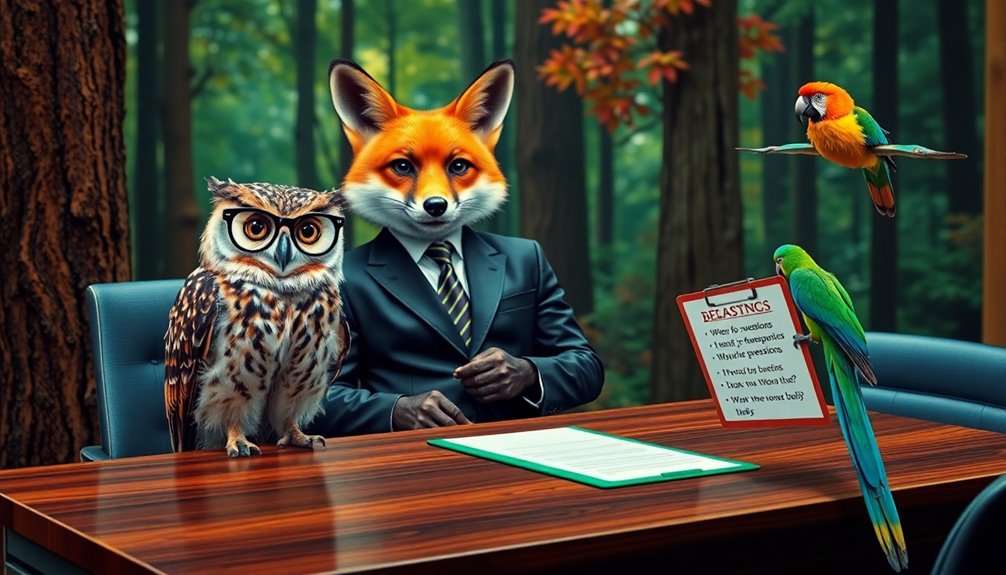Expect the unexpected in job interviews! They're dying for you to tackle questions that reveal your personality, creativity, and problem-solving skills. You might face queries about how you'd handle hypothetical situations or what animal you'd be if you had to choose. They'll also want to see your response to logical puzzles or gauge your motivation through personal aspirations. These unconventional questions aim to uncover your character and adaptability. Prepare to share unique stories and articulate your thoughts clearly. Get ready to shine, and there's more to understand about these surprising queries ahead!
Key Takeaways
- Anticipate unconventional questions that assess personality and values, showcasing your character through unique personal stories.
- Prepare for hypothetical scenarios that gauge creativity and decision-making, using structured responses like the STAR method for clarity.
- Embrace questions about career aspirations and long-term motivations to connect your personal values to the role and the company's vision.
- Reflect on your ability to adapt to industry trends and technological advancements, demonstrating foresight and strategic thinking in your answers.
- Practice articulating complex ideas simply to showcase your communication skills, making sure to engage the interviewer with thoughtful follow-up questions.
Unconventional Character Questions

While traditional interview questions often focus on skills and experience, unconventional character questions dig deeper into your personality and values. These questions help employers see beyond your resume and assess how you fit into their company culture.
For instance, when asked, "Tell me something I don't know about you," you can share a unique personal story that showcases your character.
Another challenging question may be, "Why did you leave your last job?" Here, you need to strike a balance between honesty and professionalism. You want to convey your reasons without sounding negative.
When you're asked, "Can you provide an example of a time when you failed?" it's your chance to admit a mistake and illustrate how you learned from it. Similarly, when discussing a recent success, highlight a personal achievement that reflects your dedication and skills.
Lastly, questions like, "What do you think our industry will look like in 10 years?" assess your long-term vision and understanding of the field. Using fun questions in interviews can also reveal your adaptability and creativity.
Embrace these character questions as opportunities to convey your values and aspirations, setting you apart from other candidates.
Creative Problem Solving Challenges

Unconventional character questions can reveal a lot about your problem-solving capabilities, which are essential in any job. When faced with a creative problem-solving challenge, start by gathering all relevant information to fully understand the issue.
Dive deep into brainstorming potential solutions, weighing the risks and benefits of each. Use the STAR method to structure your response: describe the situation, the task at hand, the action you took, and the result.
Don't shy away from collaborating with people outside your industry or involving colleagues from different departments. Diverse perspectives can spark innovative ideas that you may not have considered. Engaging in continuous learning helps you stay updated with new techniques and tools that can enhance your problem-solving skills.
Organize brainstorming sessions to facilitate this exchange of thoughts. If you encounter significant obstacles, reframe the problem. Seek advice from mentors or experts and conduct thorough research.
When faced with budget cuts or time constraints, be ready to restructure your project scope and think on your feet. Finally, implement your chosen solution and evaluate its effectiveness.
Share the outcomes, including metrics if possible, and reflect on lessons learned to improve future efforts. Celebrate both successes and failures to foster a culture of creativity and resilience in your workplace.
Logical Reasoning Puzzles

When it comes to logical reasoning puzzles, manhole cover mysteries and dice probability challenges are great examples that test your analytical skills. You'll find that these puzzles not only assess your problem-solving abilities but also reveal your thought process under pressure. Additionally, many major companies, such as Google, Apple, and LinkedIn, utilize these types of questions to evaluate candidates' performance under stress. Let's explore how these types of questions can make a significant impact during interviews.
Manhole Cover Mysteries
Four intriguing puzzles often arise when discussing manhole covers, particularly their round design. You might wonder why most covers are round instead of square. The answer lies in safety and practicality. Round covers can't fall into the hole, while square ones can, posing a risk. Additionally, round shapes are easier to handle and transport, making maintenance quicker. This design choice reflects the principle of lateral thinking, as it encourages innovative solutions to everyday problems.
Here's a quick comparison of round versus square manhole covers:
| Feature | Round Covers | Square Covers |
|---|---|---|
| Safety | Can't fall in | Can fall in |
| Handling | Easy to roll | Requires alignment |
| Manufacturing | Simplified process | More complex |
| Aesthetic Integration | Blends well | May stand out |
The absence of corners in round covers reduces the risk of injury during handling and guarantees uniform strength. Plus, their design allows for better integration into urban settings, enhancing overall infrastructure. So, the next time you see a manhole cover, remember these fascinating puzzles and the smart reasoning behind their design!
Dice Probability Challenges
Exploring dice probability challenges offers a fascinating way to sharpen your logical reasoning skills. These puzzles not only test your understanding of probability but also enhance your critical thinking and problem-solving abilities.
Here are four essential concepts you should grasp:
- Basic Probability: Understand that the probability of rolling a specific number on a fair die is 1/6. For instance, rolling a prime number (2, 3, or 5) has a probability of 1/2. Additionally, the odds of rolling a specific number are represented as 1:5.
- Multiple Rolls: The more you roll, the closer your frequency will match theoretical probabilities. If you roll a 5 thirty times in 400 attempts, your probability is 3/40.
- Loaded Dice: Recognize how biases in loaded dice can skew probabilities compared to fair ones. This awareness can help you identify irregularities in outcomes.
- Logical Reasoning: Use elimination and pattern recognition to solve puzzles. For example, knowing that the sum of opposite faces is always 7 can guide your reasoning when determining face configurations.
Mastering these concepts not only prepares you for interview challenges but also enhances your overall analytical skills.
Personal Motivation Queries

When you're asked about your career aspirations and goals, it's a chance to show how your ambitions align with the position. You might also face salary negotiation scenarios that test your understanding of your worth. Additionally, discussing your thoughts on lottery ticket dilemmas can reveal your values and decision-making process. Demonstrating self-motivation through your responses can further illustrate your commitment to achieving those goals independently.
Career Aspirations and Goals
Many candidates find that discussing their career aspirations and goals can be a pivotal moment in a job interview. Your response can reveal your long-term motivations and passion while showcasing how your goals align with the company's vision.
To make a strong impression, consider the following:
- Be Authentic: Share genuine aspirations that reflect your personal values and experiences, showing how they connect to the role you're applying for. This authenticity can also be beneficial when discussing your financial planning, such as establishing a retirement savings plan.
- Align with the Company: Research the company's mission and growth opportunities. Tailor your goals to demonstrate how they fit into the organization's trajectory.
- Short-term vs. Long-term: Outline both short-term and long-term goals. Mention immediate skills you plan to develop and how those contribute to your future ambitions. Additionally, emphasize your commitment to continuous learning to stay relevant in a rapidly changing industry.
- Show Enthusiasm: Express your passion for your career path. Provide examples of past experiences that prepared you for future roles and highlight your commitment to continuous learning.
Salary Negotiation Scenarios
Discussing your career goals sets the stage for a meaningful job interview, but salary negotiations can be just as pivotal in determining your fit with a prospective employer.
If salary comes up early, try to delay the discussion until you've assessed the job fit. You might say, "What's most important to me is whether or not the job is a good match for me and the company." If pressed, provide a broad salary range based on your market research.
Once you receive a job offer in writing, that's your cue to negotiate. Schedule a call with the recruiter or hiring manager and present a higher salary range than you actually desire, leaving space for negotiation. Understanding the market research can guide you in determining a competitive salary range. Additionally, having a clear understanding of your credit score can enhance your negotiating position, as it reflects your overall financial responsibility.
Back up your request by highlighting your relevant experience and accomplishments.
If the employer can't meet your salary expectations, don't hesitate to explore alternative benefits, like flexible work hours or additional vacation days.
Always approach these discussions with respect and clarity, keeping the conversation focused on finding mutually beneficial solutions.
Lottery Ticket Dilemmas
The lottery question often catches candidates off guard during job interviews, but it serves a deeper purpose than just idle curiosity. Employers want to understand your motivations and how you'd react to sudden financial changes. Your answer can reveal a lot about your work ethic, values, and long-term career goals.
Consider these points when responding:
- Motivation: What drives you? Are you passionate about your work, or is it just a paycheck? Emotional regulation is a critical aspect of understanding your motivations.
- Financial Stability: How would newfound wealth change your work behavior? Would you still find fulfillment in your role? Recognizing non-monetary aspects of job satisfaction can provide further insight into your commitment.
- Interests and Values: What would you prioritize outside of work? Are there causes or projects you'd invest in?
- Commitment: How can you reassure the interviewer of your dedication to the company even if you became financially independent?
Imaginative Scenarios to Consider

In an interview setting, imaginative scenarios can spark creativity and reveal how you think on your feet. Questions like "If you could be Batman or Robin, which one would you be and why?" not only test your decision-making but also allow you to showcase your personality. Similarly, pondering which character from Star Wars resonates with you can uncover your values and aspirations. Consider problem-solving scenarios, such as dealing with a polar bear in your fridge. Your response could highlight your resourcefulness and ability to remain calm under pressure. Alternatively, the quirky question of preferring to be attacked by one horse-sized duck or 100 duck-sized horses pushes you to weigh risks and strategize. In unusual situations, like surviving a shipwreck, your answer can reveal your priorities and survival instincts. The creative thinking questions challenge you to articulate complex ideas simply. For example, describing the color purple to someone who can't see could demonstrate your empathy and communication skills. These imaginative scenarios are designed to probe deeper into your thought processes, helping interviewers gauge not just your qualifications, but also your creativity and ability to navigate unexpected challenges. Additionally, they provide insight into your self-perception and values, which can be critical for assessing cultural fit within the organization.
Humorous Interview Dilemmas

Humorous interview dilemmas add a playful twist to traditional questioning, allowing candidates to showcase their creativity and quick thinking. These questions not only lighten the mood but also give you the chance to stand out. Here are some examples that can spark your imagination:
- What would you do if you found a penguin in the freezer? This question tests your ability to think on your feet while keeping the tone light.
- How would you sell hot cocoa in Florida? This scenario challenges you to brainstorm unconventional marketing strategies. Additionally, it encourages you to think about creative problem-solving in a unique context.
- If you could throw a parade of any caliber through your office, what type of parade would it be? Your response can reveal your personality, enthusiasm, and sense of humor.
- Would you rather fight one horse-sized duck or 100 duck-sized horses? This quirky dilemma measures your problem-solving skills in a fun way.
Embracing these whimsical questions can't only break the ice but also allow employers to see who you are beyond your resume.
Social Perspective Questions

When you're facing social perspective questions in an interview, think about how your insights can transform society effectively. You'll want to showcase your strategies for surviving isolation and how they relate to communication in a utopian context. These questions not only reveal your personal experiences but also your vision for a better social landscape. Demonstrating cultural sensitivity can further enhance your ability to connect with diverse individuals and understand their unique perspectives.
Transforming Society Effectively
Transforming society effectively requires a deep understanding of social justice advocacy and a commitment to driving change.
You need to be aware of the inequalities that exist, such as systemic racism and gender inequality, and actively work to address them.
To make a real impact, consider these essential steps:
- Educate Yourself and Others: Knowledge is power. Stay informed about pressing issues like LGBTQ+ discrimination, healthcare access, and environmental injustice. Remember that human rights framework provides a foundation for addressing these inequalities.
- Engage in Empathetic Dialogue: Approach conflicts with empathy. Listen to diverse perspectives, and foster a respectful atmosphere to encourage constructive conversations.
- Collaborate for Change: Embrace collaborative leadership. Actively engage stakeholders and value diverse voices to create inclusive solutions.
- Commit to Continuous Learning: Stay adaptable. Attend workshops, follow reputable sources, and connect with activists to enhance your understanding of evolving social justice issues.
Surviving Isolation Strategies
Surviving isolation can feel challenging, but with intentional strategies, you can create meaningful connections and nurture your well-being. Start by nurturing existing relationships. Schedule daily time to reach out to friends and family through texts, calls, or activities. Engage in shared hobbies or suggest meetups to strengthen those bonds. Don't underestimate the power of letters and cards to keep friendships alive.
To make new connections, join clubs or groups related to your interests. Taking classes or workshops can also help you meet like-minded individuals. Volunteering in your community or participating in pen pal programs can expand your social network while giving back. Social isolation is linked to increased risks of depression and heart disease, so fostering connections is vital for your health. Additionally, the importance of open communication with others can enhance your relationships during challenging times.
Consider adopting a pet for companionship and additional social interactions.
Leverage digital tools to stay connected. Video chats and social media can bridge the gap when you're apart. Explore online forums related to your interests, and don't hesitate to take classes to improve your tech skills.
Finally, focus on building a strong sense of self. Set healthy boundaries, work on your confidence, and seek professional help if isolation feels overwhelming. These strategies can lead to a richer, more connected life.
Utopian Communication Methods
Utopian communication methods in education foster a vibrant landscape for collaborative learning and resource sharing. These methods aim to bridge gaps between different educational contexts, creating a dynamic environment where students, educators, and community members thrive together. Here are some key aspects to examine:
- Community Collaboration: The Fifth Dimension model emphasizes partnerships between community institutions and higher education, enhancing resource sharing for educational activities.
- Interactive Engagement: With the "Wizard" figure facilitating interaction, children can drop in and engage freely, promoting a playful learning atmosphere that encourages exploration. This approach mirrors the importance of peer feedback in the educational process, enhancing collaborative learning.
- Addressing Binaries: This model seeks to dissolve traditional contradictions—like play vs. work and monolingualism vs. bilingualism—transforming them into opportunities for hybrid learning experiences.
- Flexible Frameworks: Utopian communication encourages multiple perspectives and co-teaching, allowing students to develop their projects within thematic settings that inspire their creativity.
Global Transformation Ideas

Global transformation ideas are fundamental for businesses looking to thrive in today's rapidly changing environment. You need to evaluate business model transformation, where you adapt your strategies to the digital landscape. This means exploring innovative ways of conducting business that can disrupt your industry, much like Netflix and Amazon have done. Continuous adaptation is essential for competitiveness in a digital landscape.
Domain transformation is another essential aspect. By leveraging your existing capabilities, you can create new market opportunities and revenue streams, as seen with Amazon Web Services. Embrace technologies like AI and IoT to break traditional market boundaries.
Cultural transformation plays a significant role too. You'll want to foster a culture that challenges the status quo and encourages experimentation. Integrating digital technology across all business areas allows you to deliver enhanced value globally.
Finally, don't overlook technological transformation. Adopting advanced technologies such as machine learning and 5G will enable you to streamline operations, enhance customer service, and provide hyper-personalized experiences.
Companies like Amazon and Siemens exemplify how these transformations can lead to remarkable success. Embrace these global transformation ideas, and you'll position your business for a vibrant future.
Unique Animal Representations

Animal symbolism carries a rich tapestry of meanings that resonate across cultures and contexts. When you're asked to represent yourself through an animal in an interview, think carefully about the attributes you want to highlight. Choosing the right animal can reflect your strengths and fit for the job.
Here are four unique animal representations to contemplate:
- Royal Bengal Tiger (India): This majestic creature symbolizes strength and endurance, showcasing your resilience in challenging situations.
- Giant Panda (China): Known for its self-sufficiency, the panda can represent your ability to thrive independently and contribute to team prosperity. Additionally, the giant panda serves as a symbol of global biodiversity and conservation challenges, emphasizing your awareness of environmental issues.
- Unicorn (Scotland): Emphasizing innocence and purity, the unicorn can reflect your innovative spirit and commitment to ethical practices.
- Dolphin: As a symbol of sociability and communication, the dolphin highlights your teamwork skills and adaptability in collaborative environments.
Unexpected Scenario Responses

During a job interview, unexpected scenario questions can catch you off guard, but they also present a unique opportunity to showcase your critical thinking skills. These questions assess how well you adapt to unforeseen events and evaluate your problem-solving abilities. Interviewers want to see if you can align your actions with the company's goals and culture while thinking on your feet. Additionally, demonstrating your ability to embrace innovation can further impress interviewers, as it indicates a forward-thinking mindset essential for modern business environments.
To effectively respond, use the STAR method. Start by outlining the situation to provide context. Next, clarify the task or problem at hand. Then, detail the actions you took to resolve the issue. Finally, discuss the results and any lessons learned. This structured approach not only highlights your thought process but also demonstrates your ability to learn from mistakes and is essential for showcasing your adaptability skills.
Prepare for these questions by gathering relevant examples from your past experiences. Focus on scenarios that showcase your creativity and resourcefulness. Practice articulating your responses to feel confident during the interview. Remember, it's all about demonstrating your capacity to handle pressure and make thoughtful decisions when the unexpected arises.
Your answers could set you apart from other candidates!
Frequently Asked Questions
What Is Your Greatest Strength and How Does It Apply to This Role?
When you're asked about your greatest strength, think of a time you solved a complex problem.
For instance, you might recall leading a team through a project with tight deadlines. Your strong problem-solving skills helped you analyze challenges and implement solutions efficiently, resulting in a successful outcome.
This strength directly aligns with this role, as it requires innovative thinking and collaboration to drive results and meet company objectives.
Describe a Challenging Work Situation and How You Overcame It
You faced a challenging project with tight deadlines and limited resources.
Your team struggled with communication, leading to missed milestones.
You analyzed the situation, identified key roles, and facilitated open discussions to clarify responsibilities.
By implementing weekly check-ins, you fostered collaboration and accountability.
As a result, the project was completed on time, boosting team morale and improving processes for future tasks.
You learned the value of clear communication and proactive leadership.
How Do You Prioritize Your Tasks in a Busy Environment?
As the saying goes, "A stitch in time saves nine."
In a busy environment, you prioritize tasks by evaluating urgency and importance. You might start with the Eisenhower Matrix, categorizing tasks into four quadrants.
Then, use the ABCDE method to label what's critical and what can be delegated. By focusing on high-priority tasks first, you guarantee that key objectives are met, keeping your workload manageable and your productivity high.
Where Do You See Yourself in Five Years?
When you're asked, "Where do you see yourself in five years?" think about your career aspirations.
You'll want to express your desire to learn and grow within the company. Focus on developing key skills that align with the role, and mention how the position will help you contribute to the company's success.
Show your enthusiasm for ongoing professional development and emphasize your commitment to making a meaningful impact in your field.
What Motivates You to Perform Your Best at Work?
What motivates you to perform your best at work is the recognition you receive for your hard work. When your efforts are acknowledged, it boosts your confidence and encourages you to keep pursuing excellence.
You also thrive in an environment that offers growth opportunities, as it makes you feel valued. Plus, knowing your role contributes to the company's success gives you a sense of purpose, driving you to excel further.
Conclusion
In a world where traditional interview questions are tossed aside, embracing the unexpected can set you apart. You're not just answering questions; you're revealing layers of your personality and creativity. So, why not turn these shocking inquiries into opportunities? After all, isn't the ability to adapt and think on your feet what employers truly desire? By tackling these unconventional challenges, you'll not only showcase your skills but also leave a memorable impression that lingers long after the interview.









